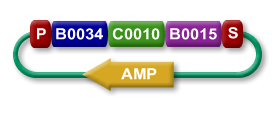Difference between revisions of "An Introduction to BioBricks"
Jamesbrown (Talk | contribs) (→How do I make a BioBrick?) |
Jamesbrown (Talk | contribs) m (→Designing & Building BioBrick Devices & Systems) |
||
| Line 24: | Line 24: | ||
|} | |} | ||
| − | ==Designing | + | ==Designing BioBrick Devices & Systems: Tools & Methods== |
| − | + | {| | |
| − | + | |[[image:MultiPartsinplasmid.png]] | |
| + | |width=600px| | ||
| + | BioBrick parts can be assembled to form useful devices, through a process often refeed to as 'Standard Assembly' This uses normal cloning techniques based on [[Assembly:Restriction enzymes|restriction enzymes]], purification, ligation, and transformation. BioBrick parts are [[Assembly:Composable|composable]]; allowing endless numbers of biobricks to be pieced together to form higher systems. | ||
| + | The assembly to the left shows 3 BioBricks assembled to create a simple device. You can learn more about this device by following the link to its associated page in the registry. You may like look into: | ||
| + | *[[Assembly:Standard assembly|Standard Assembly]] - <i>The classical method of BioBrick assembly, done at the lab bench</i> | ||
| + | *[[Assembly:Restriction enzymes|BioBrick Restriction Enzymes]] | ||
| + | *[[Assembly:Rolling assembly|Rolling Assembly]] | ||
| + | *[[Assembly:Robotic assembly| Automated assembly]] - <i>currently in late stage development at iGEM labs</i> | ||
| + | |} | ||
====Adding the part to the registry==== | ====Adding the part to the registry==== | ||
This protocol is quick and easy. A comprehensive guide can be found [[Basic Biobrick, example 1|here]] | This protocol is quick and easy. A comprehensive guide can be found [[Basic Biobrick, example 1|here]] | ||
Revision as of 15:04, 14 July 2006

|
BioBricks are a set of interchangable parts, designed with a view to building biological systems in living cells. The picture to the left shows BioBrick part BBa_0034 within a plasmid. The brick is flanked by a standard biobrick prefix (P) and suffix (S). The yellow arrow represents the plasmid's antibiotic resistance gene and the green arrow, its origin of replication. Click the image to find out more or alternatively see: |
Building BioBrick Systems

|
BioBrick parts can be assembled to form useful devices, through a process often refeed to as 'Standard Assembly' This uses normal cloning techniques based on restriction enzymes, purification, ligation, and transformation. BioBrick parts are composable; allowing endless numbers of biobricks to be pieced together to form higher systems. The assembly to the left shows 3 BioBricks assembled to create a simple device. You can learn more about this device by following the link to its associated page in the registry. You may like look into:
|
Designing BioBrick Devices & Systems: Tools & Methods

|
BioBrick parts can be assembled to form useful devices, through a process often refeed to as 'Standard Assembly' This uses normal cloning techniques based on restriction enzymes, purification, ligation, and transformation. BioBrick parts are composable; allowing endless numbers of biobricks to be pieced together to form higher systems. The assembly to the left shows 3 BioBricks assembled to create a simple device. You can learn more about this device by following the link to its associated page in the registry. You may like look into:
|
Adding the part to the registry
This protocol is quick and easy. A comprehensive guide can be found here
